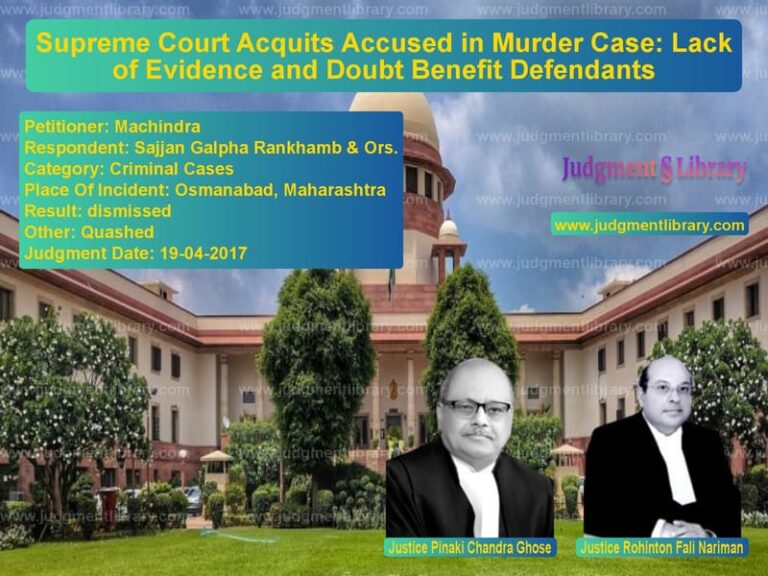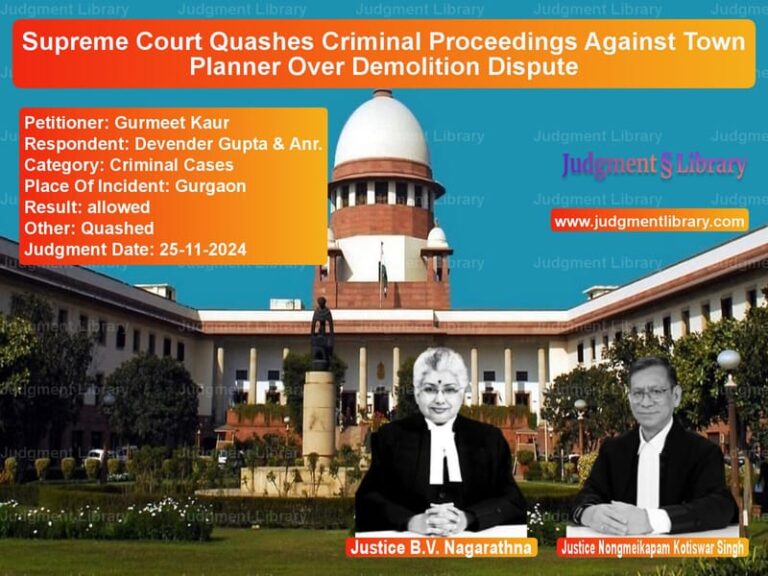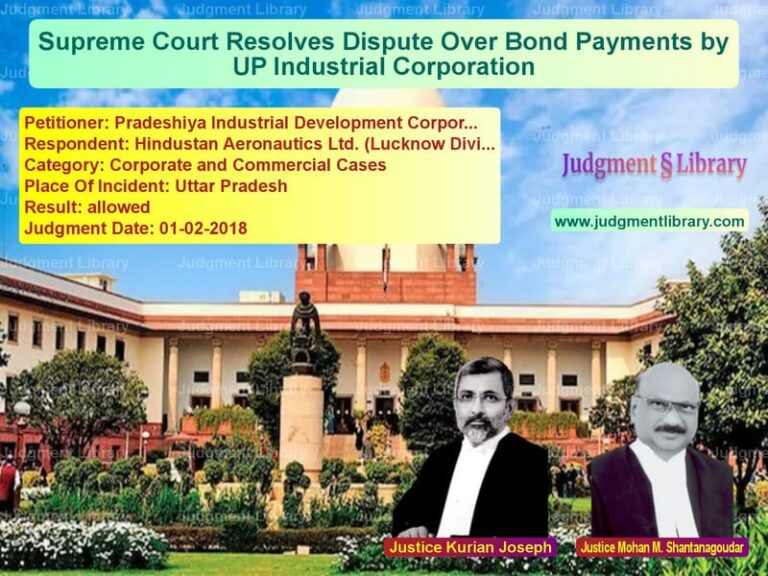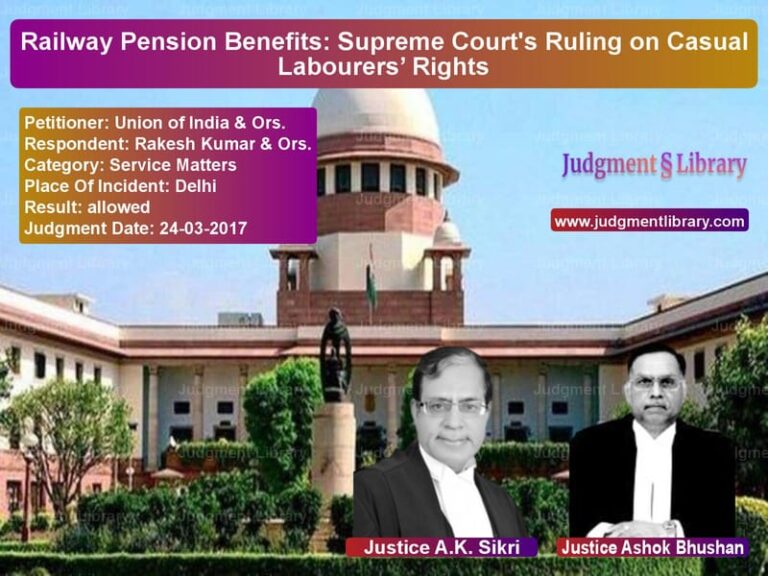Supreme Court Modifies Sentence in Corruption Case Against Retired Treasury Official
The Supreme Court of India delivered a significant ruling in the case of Naresh Chaubey vs. Central Bureau of Investigation, addressing issues of corruption, misappropriation of public funds, and the judicial discretion in sentencing. The case involved the fraudulent withdrawal of treasury bills in Bihar’s Animal Husbandry Department, leading to the conviction of the appellant under the Indian Penal Code (IPC) and the Prevention of Corruption Act (PC Act).
Background of the Case
The case arose from a large-scale corruption scandal in the Animal Husbandry Department of Bihar, where funds were misappropriated through fraudulent treasury bills. The appellant, Naresh Chaubey, was a Dealing Assistant in the Treasury Department and was accused of processing fake bills that facilitated the embezzlement of public money.
An inquiry was initiated after the Animal Husbandry Officer in Muzaffarpur received intelligence regarding wrongful withdrawals. A committee was set up to investigate the suspected treasury transactions, which found that Rs. 6,00,000 had been misappropriated. Based on this report, a police case was registered under Sections 467, 468, 420, and 409 of the IPC. Following directives from the High Court of Patna and the Supreme Court, all cases related to the misappropriation were transferred to the Central Bureau of Investigation (CBI) for further investigation.
Key Legal Issues
The Supreme Court considered the following legal issues:
- Whether the conviction of the appellant under Sections 420, 465, 467, 468, and 471 of the IPC and Sections 13(1)(c) and (d) of the Prevention of Corruption Act was justified.
- Whether the sentence imposed by the trial court and upheld by the High Court required modification due to the appellant’s age and health condition.
- Whether the appellant’s conduct, role in the misappropriation, and evidence presented justified a reduction in sentence.
Petitioner’s Arguments
The appellant, represented by his legal counsel, argued that:
- He had already served 20 months out of the 36-month sentence imposed on him.
- He was 75 years old and suffering from several health ailments, making it difficult for him to serve the remaining sentence.
- The courts below had overlooked mitigating factors, including his deteriorating health and his retirement from service.
- The sentence should be reconsidered based on humanitarian grounds.
Respondent’s Arguments
The Central Bureau of Investigation (CBI), representing the prosecution, contended that:
- The appellant was directly involved in the fraudulent withdrawal of treasury bills and had misused his position for personal gain.
- The evidence, including eyewitness testimonies and documentary records, conclusively proved his role in the misappropriation of funds.
- The conviction was based on sound legal reasoning and should not be disturbed.
- The appellant’s sentence was proportionate to the gravity of the offense and should be upheld.
Supreme Court’s Observations
The Supreme Court, comprising Justices Arun Mishra and L. Nageswara Rao, thoroughly reviewed the lower court judgments and the evidence presented. The Court made the following key observations:
- The appellant had indeed committed acts of misappropriation and embezzlement of public funds by processing fraudulent treasury bills.
- The trial court had conducted a thorough analysis of the evidence, and the High Court had rightly affirmed the conviction.
- Given the settled principle of law, the Supreme Court generally does not re-appreciate evidence when affirming lower court judgments in criminal cases.
- The appellant’s involvement in processing fraudulent bills without proper authorization justified his conviction under the relevant sections of the IPC and the PC Act.
- The Court found no reason to interfere with the conviction but took note of the mitigating circumstances, including the appellant’s age and health condition.
The Court stated:
“We do not consider it necessary to repeat the reasons that have been assigned by the courts below while convicting and sentencing the Appellant. We accordingly confirm the conviction of the Appellant.”
Final Judgment
The Supreme Court ruled as follows:
- The conviction of the appellant was upheld.
- The sentence imposed by the trial court and affirmed by the High Court was modified to the period already undergone.
- The appellant was released, and his bail bonds were discharged.
- All pending applications related to the case were disposed of.
Implications of the Judgment
The ruling has several significant implications for corruption cases and judicial discretion in sentencing:
1. Affirmation of Accountability in Corruption Cases
The judgment underscores the importance of holding public officials accountable for financial misappropriation and corruption.
2. Consideration of Humanitarian Grounds in Sentencing
The Court demonstrated a balanced approach by modifying the sentence based on the appellant’s age and medical condition while upholding the conviction.
3. Limited Scope for Appeal in Criminal Convictions
The ruling reinforces the principle that appellate courts do not re-examine factual findings unless there is a substantial legal error.
4. Judicial Discretion in Sentence Reduction
The judgment highlights the Supreme Court’s discretionary power in considering leniency in sentencing while maintaining the integrity of the conviction.
Conclusion
The Supreme Court’s decision in this case balances the need for strict enforcement of anti-corruption laws with considerations of age and health. While the conviction was upheld to reinforce accountability, the sentence modification reflects judicial sensitivity to individual circumstances. This ruling sets an important precedent in handling corruption cases involving retired public officials.
Don’t miss out on the full details! Download the complete judgment in PDF format below and gain valuable insights instantly!
Download Judgment: Naresh Chaubey vs Central Bureau of In Supreme Court of India Judgment Dated 16-11-2017.pdf
Direct Downlaod Judgment: Direct downlaod this Judgment
See all petitions in Fraud and Forgery
See all petitions in Money Laundering Cases
See all petitions in Public Sector Employees
See all petitions in Judgment by Arun Mishra
See all petitions in Judgment by L. Nageswara Rao
See all petitions in partially allowed
See all petitions in Modified
See all petitions in supreme court of India judgments November 2017
See all petitions in 2017 judgments
See all posts in Criminal Cases Category
See all allowed petitions in Criminal Cases Category
See all Dismissed petitions in Criminal Cases Category
See all partially allowed petitions in Criminal Cases Category







